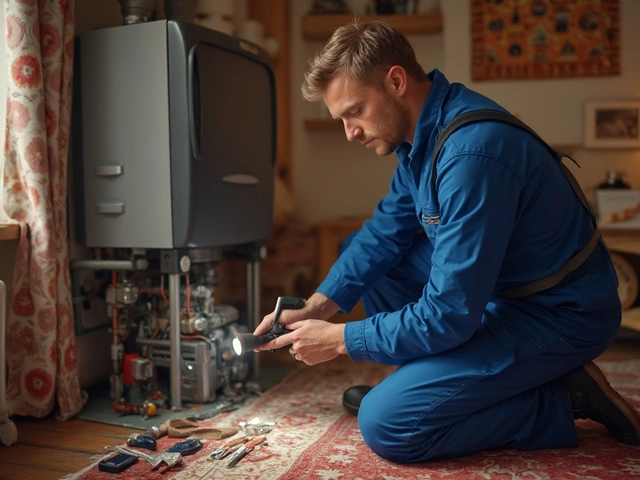Picture this: It’s a cold, grey Bristol morning, your mug of tea is barely lukewarm, and your dog Muffin is eyeing you suspiciously because the radiator isn’t kicking out any heat. Your boiler’s not behaving. We’ve all heard the usual advice—call a professional, look up the error code, maybe give it a little tap just in case it works like a stubborn telly remote. But at some point, you’re going to face the toughest question: should you repair your current boiler or bite the bullet and get a brand new one? The answer isn’t always obvious. Navigating this decision takes a bit more thought than you might expect, especially as boilers have become more complex and pricey over the last decade.
Understanding Your Boiler: Life Expectancy, Common Faults, and Realistic Costs
Before you even touch the thermostat, let’s talk about how long boilers actually last. The usual lifespan for a gas boiler in the UK is around 10 to 15 years. If you’re hitting the ten-year mark, it’s pretty common to see more breakdowns—kind of like my dog Muffin and his old tennis ball. Repairs get more costly as parts become rare, and modern safety regulations might mean your old boiler’s not up to scratch. On average, a one-off boiler repair in Bristol in 2025 can cost anywhere between £90 and £450, depending on the issue. Simple fixes—like replacing a thermostat, fixing a leaky valve, or clearing sludge from heat exchangers—stay on the low end. But if you’re looking at major repairs like a replacement heat exchanger, the bill can rocket past £500, which feels like daylight robbery when you’re standing there in your dressing gown shivering.
I looked at a recent survey by Which? showing that 60% of homeowners reported spending under £150 for minor boiler repairs in the past year, but nearly 20% got hit for more than £350. Black soot, irregular pilot lights, and pressure drops are common, but if faults keep coming back like a bad rash, then it might be time to consider moving on from endless repairs. I’ve had my share of weekend boiler woes; by the third winter callout, I started to seriously debate whether I was wasting money on an ancient machine.
Parts for older models are harder to source. My mate Jon, who works as a heating engineer, shared that parts for boilers over 12 years old often come with massive markups—if they’re even available. Many plumbers share war stories of trawling eBay for obscure solenoids instead of ordering quickly from a supplier. Plus, safety isn’t something you want to gamble with. The older your system, the greater the safety risks, as standards have tightened over time.
Want a quick check? Here’s a table with typical costs in the UK for 2025 for common boiler repair issues and how they compare to replacement:
| Repair Type | Average Cost (2025) | Time Involved | Notes |
|---|---|---|---|
| Thermostat Replacement | £90-£150 | 1 hour | Simple, quick fix |
| Heat Exchanger Replacement | £400-£650 | 2-4 hours | Pricey; often a replacement trigger |
| Pilot Light or Ignition Repair | £120-£250 | 1-2 hours | Moderate difficulty |
| Annual Service | £80-£130 | 1 hour | Critical for longevity |
| New Boiler Installation | £1,800-£3,500 | 1-2 days | High upfront; warranties included |
If you’re eyeing several high-ticket repairs, the maths starts to add up quickly—and not in your favour.
Signs It’s Time to Replace: When Repairing Isn’t Worth the Hassle
So, when does fixing your boiler stop making sense? A few loud signals should get your attention. First up, if repairs have become a routine, ask yourself if you’re planning on funding your heating engineer’s next family holiday. There’s that old rule: if your repair bill comes to more than half the cost of a new boiler, it’s usually smarter to quit while you’re behind. If you’re constantly calling in an engineer, or if your gas bills are mysteriously creeping up every winter, that’s another red flag. The boilers we got fitted back in the early 2000s simply don’t run as efficiently as today’s models. Old boilers run at about 70-80% efficiency, while a current condensing boiler can hit over 90%—that’s a massive difference in wasted energy and running costs.
Noisy clanking or banging, regular leaks, and persistent error codes all spell trouble. If you’ve been topping up system pressure or bleeding your radiators more often than you’re doing food shops, it’s a sign your system is losing the plot. Another tip: if the manufacturer no longer supports your model, reliability is only going to get worse. Some households keep plugging along with 20-year-old boilers—until that one winter day when a fault puts the whole heating system out of action for a week or more.
Take a look at safety, too. Carbon monoxide leaks are deadly serious, and older boilers—especially those with poorly maintained flues—are simply more risky. The NHS estimates that carbon monoxide poisoning sends up to 4,000 people to A&E each year in England alone. It’s not just about efficiency—if your boiler’s been flagged by a qualified engineer for safety reasons, don’t wait another day. Muffin may love snuggling under blankets, but nobody wants an unsafe home.
Boiler brands matter too. Some, like Worcester Bosch and Vaillant, have stellar records for reliability and customer service, while others tend to conk out sooner. If your boiler is from a notorious budget brand, even a cheap repair might not make sense in the long run. The Energy Saving Trust points out that a new efficient boiler can save you up to £500 each year in fuel bills compared to an old G-rated system, depending on your usage. Suddenly that big upfront spend doesn’t seem so steep.

The Realities of Repair: Pros, Cons, and How to Get the Best Value
Everyone loves a bargain, but chasing endless repairs can be like pouring tea into a leaky cup. There are definitely times when repair makes perfect sense: maybe your boiler is less than eight years old, hasn’t broken down much, and you’re just facing a one-off job like replacing a fan or PCB board. If your heating engineer is honest about which parts are worn—and doesn’t pressure you into extra work—you can usually squeeze a few more winters out of your system without too much anxiety.
But beware of repair traps. Some fixes only paper over deeper issues. I once replaced the diverter valve on my last boiler three times in five years, only to learn the root cause was limescale and old radiators, not the valve itself. Know what you’re dealing with: ask your engineer for clear explanations and estimates up front. Get a second quote if something sounds off. A trustworthy repair will usually come with a short warranty for parts and labour—if an engineer won’t offer this, walk away.
Think of repair as a holding pattern, a way to buy yourself time—maybe you’re saving up for a big replacement, or perhaps you’re moving soon and don’t want to invest in a new installation you won’t benefit from directly. Repairs can bridge that gap. But in every case, compare the costs and consider the peace of mind. Emergency callouts at Christmas or during a freezing snap cost a fortune and cause endless stress. The average emergency repair over the last two winters was nearly £290 in the UK, based on stats from HomeServe.
Maintenance is everything. I can’t overstate this one—book an annual service and keep an eye out for early warning signs (sludge build-up, strange noises, odd smells). Power flushing your system every few years keeps everything ticking over, and water softeners can make a huge difference if you live in a hard water area like Bristol. If your boiler’s still in warranty, repairs are almost always the smart move; out-of-warranty, weigh repair costs against the reliability and efficiency gains of a new model.
How to Make Your Decision: Practical Steps and Mistakes to Dodge
Stuck on the fence? Here’s how I’d break it down. Start with age—if your boiler is under eight years, repair is usually the way to go. Between 8 and 12 years old? Check how often things are going wrong, and tot up last year’s repair bills. Over 12 years or with repeated major faults, replacement starts to look like the best move. Pay attention to energy efficiency: do you have triple-digit winter bills, or has your usage jumped without any changes in your habits? Time to upgrade.
Get at least two quotes for any major repair or boiler replacement—that way you’ll spot if someone is taking the mick. Dig into the warranty. New boilers aren’t cheap, but manufacturers now offer strong guarantees, sometimes up to 10 years if installed by accredited fitters. That’s a decade of worry-free central heating. Also, check if your home insurance or any maintenance plan covers breakdowns—many policies lump in boiler cover, so you might already be protected for the next hiccup.
Be ready for the hidden extras with replacement. It’s not just the boiler—the average job in the UK now includes flushing the system (£350 or so), installing a magnetic filter (£120), and upgrading your thermostat, which all add up. Don’t forget your local council or utility provider may offer grants or financing for energy-saving upgrades. The UK’s Boiler Upgrade Scheme is live for eligible homes, with grants of up to £7,500 for switching to low-carbon heating systems which, if you’re feeling brave, could open the door to heat pumps or hybrid set-ups instead. That might not be for everyone, but it’s worth checking out.
If you’re renting, don’t touch the boiler yourself—report problems to your landlord right away. Homeowners with pets (especially nosey ones like Muffin) should make sure engineers know about them and keep animals clear during any visit. Engineers appreciate a clear workspace and less excitement from random dog zoomies.
Try this quick decision checklist to keep things clear:
- How old is your boiler?
- Are repairs still affordable?
- Is the boiler out of warranty, and is it supported by the manufacturer?
- Is your home staying warm and your bills reasonable?
- Has an engineer flagged any safety concerns?
If you answer ‘yes’ to more than two, lean toward replacement. But if it’s a minor fix and the first major problem, a repair gives you more time to plan.
The sharpest move? Stay proactive. Don’t ignore early signs, keep your annual servicing appointments, and shop around when the big decisions need making. Boilers keep the heart of our homes ticking, and with a little attention, you’ll keep those mugs of tea hot—and your dog a little less grumpy on chilly mornings.




